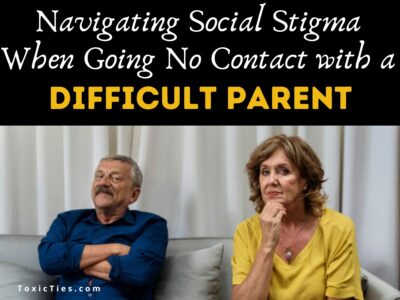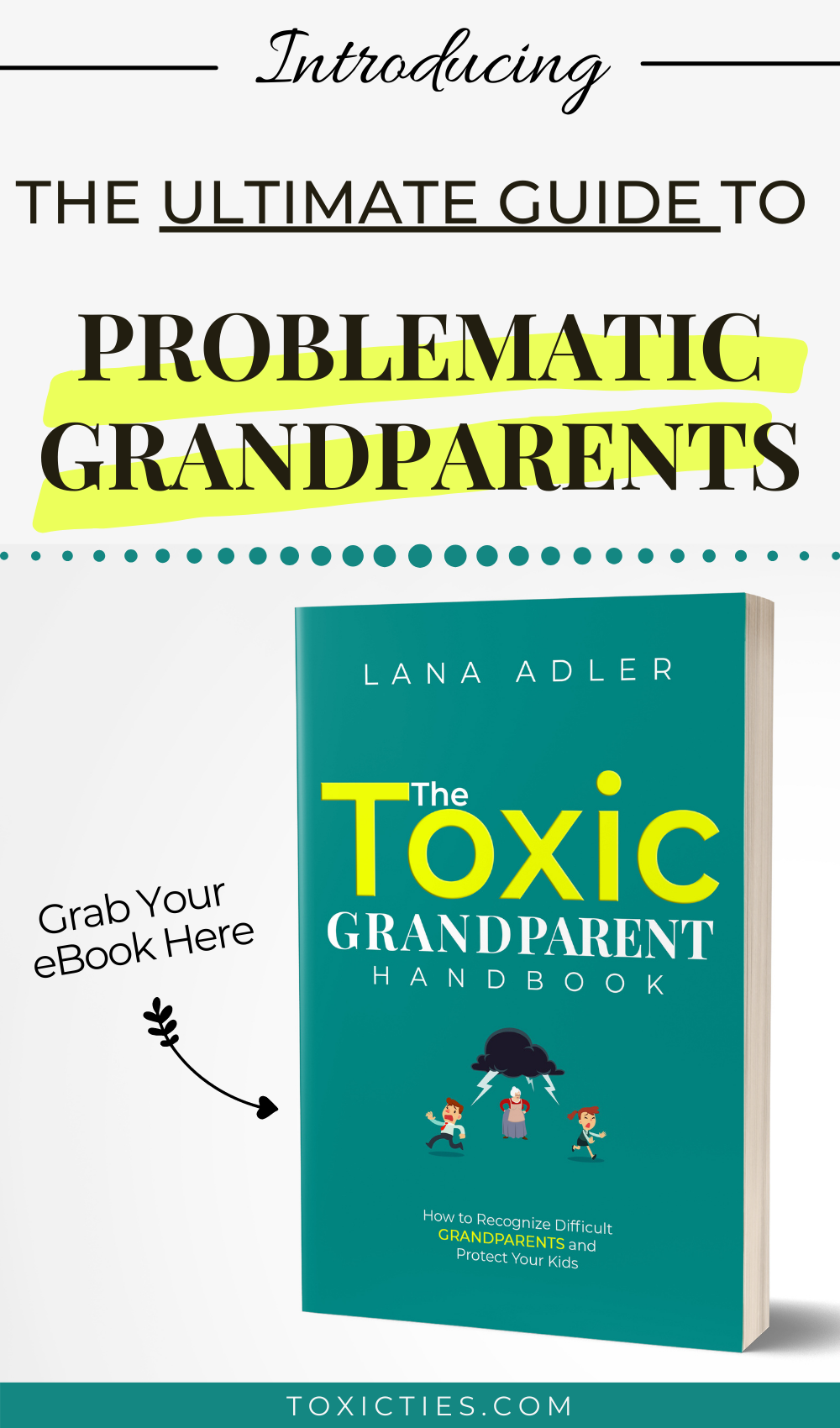Do toxic parents get better in old age or do they become even more insufferable?
On this website, we talk a lot about toxic or narcissistic parents, the lies they taught you, and how to stop seeking love and validation from them.
But any exploration of an abusive parent’s psychology would be incomplete without understanding how mental and physical frustrations that come with aging affect someone with an already negative disposition.
Does old age affect toxic parents differently than other people?
How Does Aging Affect Most People?
As people age, they undergo many physiological and psychological changes. These changes include cognition, personality, and emotions, and are influenced by genetics and the social context in which every person exists.
Although these changes are significant, they build on an existing personality structure, reflecting the continuity principle. So most people maintain the same basic personality traits throughout their lifetime.
When people experience drastic personality changes as they age, it’s usually due to illness, mental deficits, or other serious circumstances.
For example, Alzheimer’s disease, frontotemporal dementia, and other types of dementia often bring about profound psychological shifts. In fact, a change in personality is the first symptom of cognitive decline, not memory loss.
So, people don’t typically change for the worse as they age, unless they become ill. On the contrary, most people experience positive changes in old age, such as an increased sense of peace, gratitude, and wisdom.
However, this is not the case with a toxic parent.
But before we delve into the subject deeper, let’s address what a toxic parent is.

What is a Toxic Parent?
“Toxic parent” is an umbrella term that encompasses narcissistic, difficult, abusive, controlling, cruel, critical, manipulative, demanding, emotionally immature, selfish, and unreasonable parents.
It’s the type of parents who remain a constant psychological menace to their children well into their adulthood, unless the children wise up and sever the relationship.
It stands to reason, then, that a toxic parent is someone with severe emotional deficits.
To be fair, we all have emotional limitations and no parent is perfect.
We all resort to dysfunctional behavior patterns when we’re tired, hurt, or under stress. And we’re all affected by unhealed wounds from our childhoods.
But there is a difference between a systematic behavioral pattern and a temporary relapse.
Toxic parents display consistent abusive behavior, and they often get worse as they age.
Let’s see why that is.

How Does Old Age Affect Toxic Parents?
Aging presents a unique challenge to abusive or controlling types.
As the parents become older, their dysfunctional conscious and unconscious behaviors and attitudes intensify. So by the time the toxic parent reaches their “golden years,” they are arguably in the worst shape of their life – physically, emotionally, and spiritually.
Consider these age-related factors that make the parent’s existing psychological issues even more challenging to deal with.
1. Physical Limitations
They may be dealing with chronic illness, pain, or some other physical limitation.
That can cause them to become increasingly dependent on others, making the parent resent their caretakers and be unreasonably demanding.
As the parent loses physical prowess, they can also become more verbally or emotionally abusive in order to regain control.
3. Cognitive Limitations
They may have cognitive difficulties, such as being forgetful, not being able to complete tasks they usually were able to complete, etc.
That can also cause them to lash out more than before.
3. Appearance
They don’t look like they used to, so they may be obsessed with trying to keep up a youthful appearance.
It’s particularly true for narcissists who have the hardest time aging. They see wrinkles and gray hair as a cosmic injustice perpetrated against them, not a natural process that everyone experiences eventually.
4. Ingrained Mentality
They may be more impatient and irritable than before.
Although research shows that most people become more emotionally stable and agreeable as they age, toxic individuals become even more entrenched in the victim mentality, or in the need to control others.
5. Marital Troubles
They may be having a difficult time in their marriage or they lost a spouse. So now they feel alone, abandoned, and fearful of the future.
That can also cause a worsening of toxic behaviors.
6. Financial Troubles
They may have lost their income, or they are fearful of not having enough in old age.
That can result in financial abuse in addition to emotional abuse.
Does that sound like the toxic parent in your life?
The Difference Between Successful and Unsuccessful (Toxic) Aging
Gloria Davenport, the author of “Working with Toxic Older Adults,” draws a stark distinction between successful and unsuccessful (or toxic) aging.
According to her blind study, successful agers “assumed full responsibility for themselves, were problem solvers, had a positive attitude, maintained effective support systems, and did not play psychological games. With integrity, they were appropriately honest and direct with others.”
In contrast, toxic agers took no responsibility for their actions, weren’t motivated to solve problems, and had a tendency to blame others for their misfortunes, especially family members.
“Nothing was ever right. Criticism and blame were the only responses. Negativity, self-centeredness, and victimization marked the emotional abuser’s attitude.”

Filial Maturity vs. Filial Anxiety
As we’ve discussed, natural age-related changes that occur in any elder adult’s life intensify the toxic parent’s negative personality traits.
Not only that, toxic parents are often unable to handle the changes in the family structure.
As people age, their position within the family changes. It especially applies to parent-child relationships, when parents move from the position of a caretaker to the one being taken care of.
In the best-case scenario, as children grow up and start families of their own, they reach the stage of filial maturity. This is the time when they can relate to their parents as equals, appreciate the challenges of parenthood, share their thoughts and feelings openly, etc.
However, not every family gets to this point. In families where one or both parents show toxic traits, adult children may feel uneasy, stressed, and fearful about their parents’ aging. They may increasingly start seeing their parents as a burden they have to carry.
In this case, filial anxiety takes place of filial maturity. Filial anxiety is the fear of having to take care of aging parents.
This sense of filial anxiety and filial obligation becomes worse as the parents begin showing clear signs of aging such as decreased mobility, cognitive decline, etc.
For the difficult parents who are used to being in control, this is a difficult transition, too.
The “Empty Nest Syndrome”
Another difficult transition toxic parents struggle with is the “Empty Nest Syndrome.”
The “Empty Nest Syndrome” refers to the distress parents may feel over the loss of their identity as a parent and guardian.
Research shows that, despite common misconceptions, for many older adults the empty nest is a positive step that improves the quality of their marriage and allows for more leisure time.
However, toxic parents who are emotionally enmeshed with their children or who have their identity wrapped up in their parental role have a hard time accepting that the children had grown up.
They deny their children the right to become separate individuals and continue to dictate their choices. Many toxic parents will actually encourage their children’s dependence on them and punish — whether overtly or covertly — any displays of independence.
They will also become the typical overbearing in-laws who habitually give invasive advice or insert themselves in their children’s personal lives.
For these types of parents, the empty nest can be an agonizing experience that worsens their manipulative and abusive tendencies.

Final Thoughts on How Old Age Affects Toxic Parents
To answer the question asked at the beginning of this article — no, toxic parents typically do not get better in old age. Arguably, they get worse.
All the changes associated with aging, including changes in the family structure, have a deleterious effect on people with difficult personalities (or those bordering on personality disorders).
If you have an aging toxic parent (or in-law), you may have noticed as they age, encounters with them are becoming more painful and upsetting.
This is true of most toxic people — they get more toxic with age. But when you are their child, you could be getting the brunt of it.
It’s even worse when you are the caregiver for your difficult parent. Though you may love and want the best for them, dealing with their increasingly abusive antics may feel absolutely unbearable.
So what should you do? Tolerate the abuse or protect yourself and live with the guilt?
This is a choice each one of us has to make one day and live with.
Whatever you decide, remember that your psychological well-being is non-negotiable and that in the end, it is your responsibility to protect yourself from harm.
References
Adler, L. (2020). The Toxic Grandparent Handbook: The Parents’ Guide to Protecting Your Kids.
Davenport, G. (2006). Working with Toxic Older Adults: A Guide to Coping With Difficult Elders. Springer Publishing Company.
Friedman, R. (2009). When Parents Are Too Toxic to Tolerate. Retrieved from Better Days and Nights.
Whitbourne, S., & Whitbourne, S. (2020). Adult development and aging. Wiley.

NEXT
How to Deal With Guilt-Tripping From a Manipulative Parent
Toxic Parenting: 9 Ways to Avoid Repeating Your Parent’s Mistakes
Family Estrangement: How to Move on From Cutting Toxic Family Ties








They get worse with age. Abusive as ever at age 80. Don’t confront them- go no contact for your health. I am a happy empath and she hates me. Loved life since I was born- will never let her change me. Grateful for my love of life and people!
I found this very helpful I had a narcissist mother and an enabler father and he was some thing else aswell but we won’t go into that. from birth my mother mollycoddled me but in a very unhealthy and harmful way basically she wanted me to be exactly the same as her which included wanting me to be ill when I wasn’t ill but she needed me to be ill or she wouldn’t be able to like me. When I turned 9 she left the family home and abandoned me. I am 51 and I basically have nothing in life.